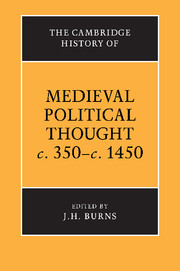Book contents
6 - The Latin fathers
from III - Beginnings: c. 350–c. 750
Published online by Cambridge University Press: 28 March 2008
Summary
The problem of the Christian Empire: ‘Imperium’ and ‘Sacerdotium’
Two traditions shaped the political thought of Western Christendom in the later fourth and the early fifth centuries, the age of St Ambrose and St Augustine. The first was the collection of ideas about human society which the Christian fathers of the fourth century inherited from the pre-Constantinian period. This included, of course, the hints on these subjects contained in the New Testament writings as well as ideas elaborated by Christians of the second and third centuries, in large part but not entirely in their reflection on the New Testament hints and their implications (see part I, chapter 1 above). The second set of ideas consisted of those engendered by the Christian response to the conversion of Constantine and to the progressive christianisation of the Roman Empire culminating, during the years which spanned the careers of Ambrose of Milan and Augustine of Hippo, in the official establishment of Christianity as the legally enforced religion of the Empire. Christians have always been apt to see the conversion of Constantine as a watershed between the age of a persecuted church and the age of a triumphant established Christianity. Whatever the appropriateness of such a view may be to the historical development (see Introduction to part III, above pp. 86–7), it does only partial justice to the political ideas rooted in the two different sets of circumstances, and to their overlap in the post-Constantine age.
- Type
- Chapter
- Information
- Publisher: Cambridge University PressPrint publication year: 1988
References
- 79
- Cited by

